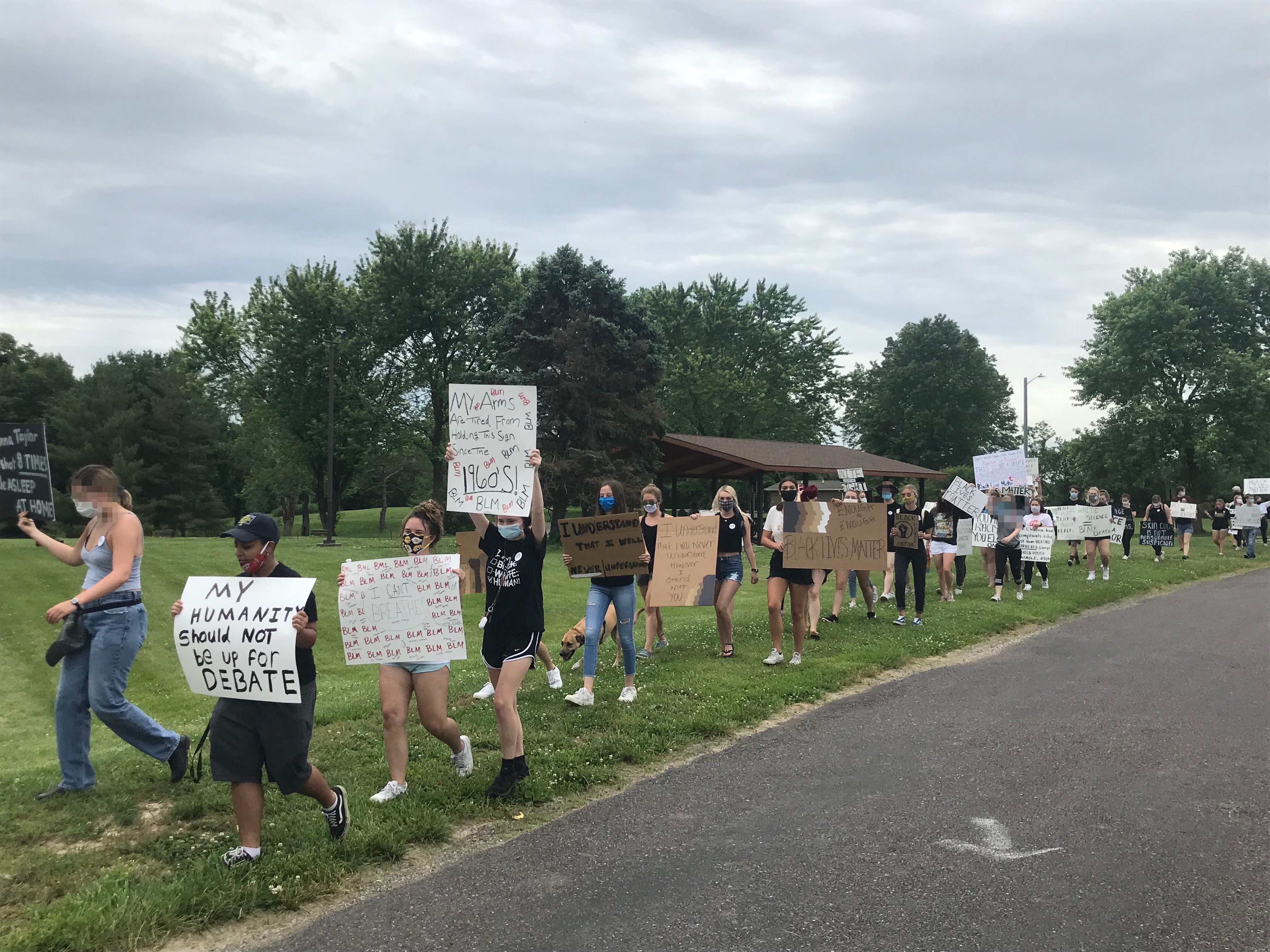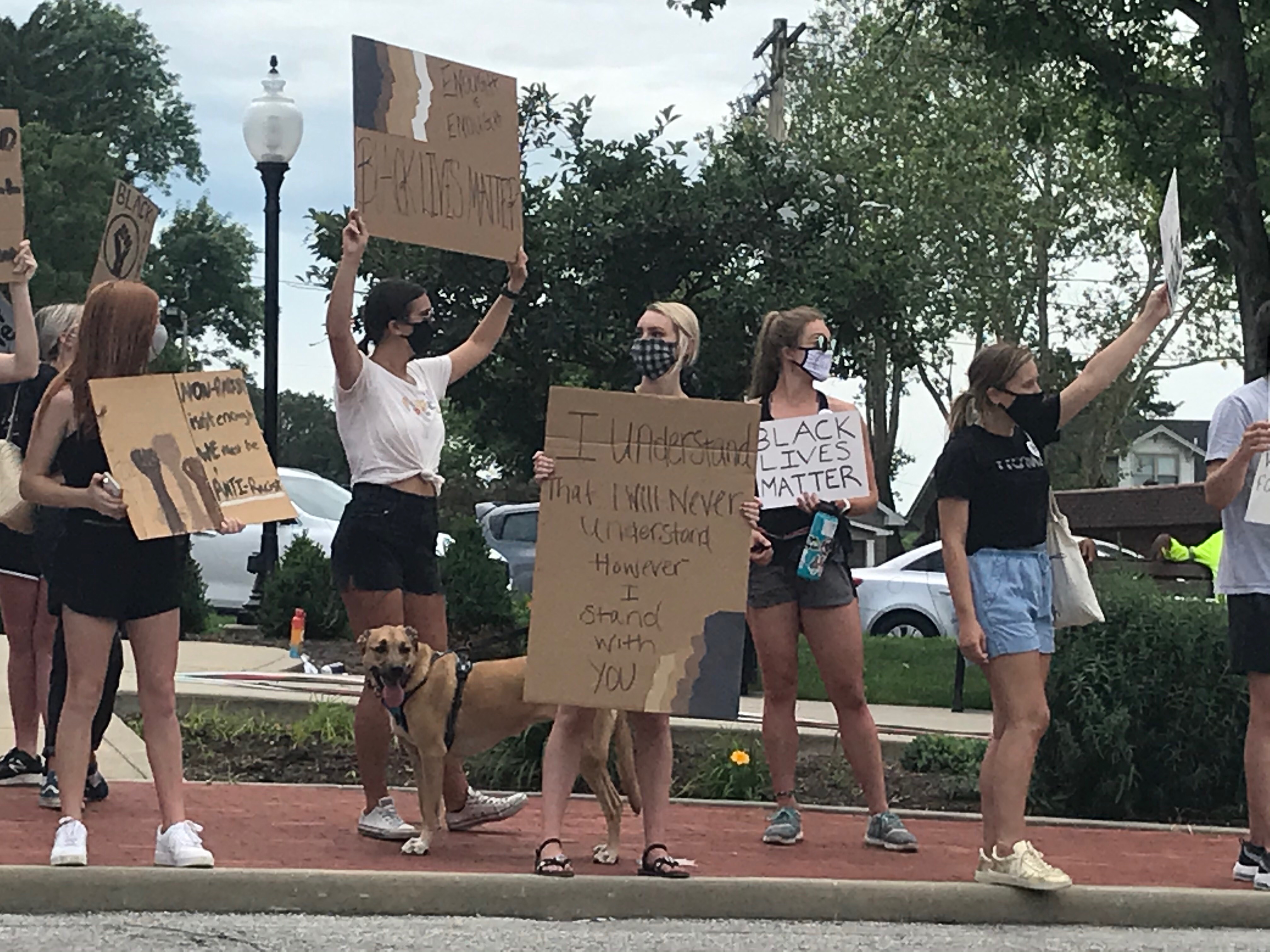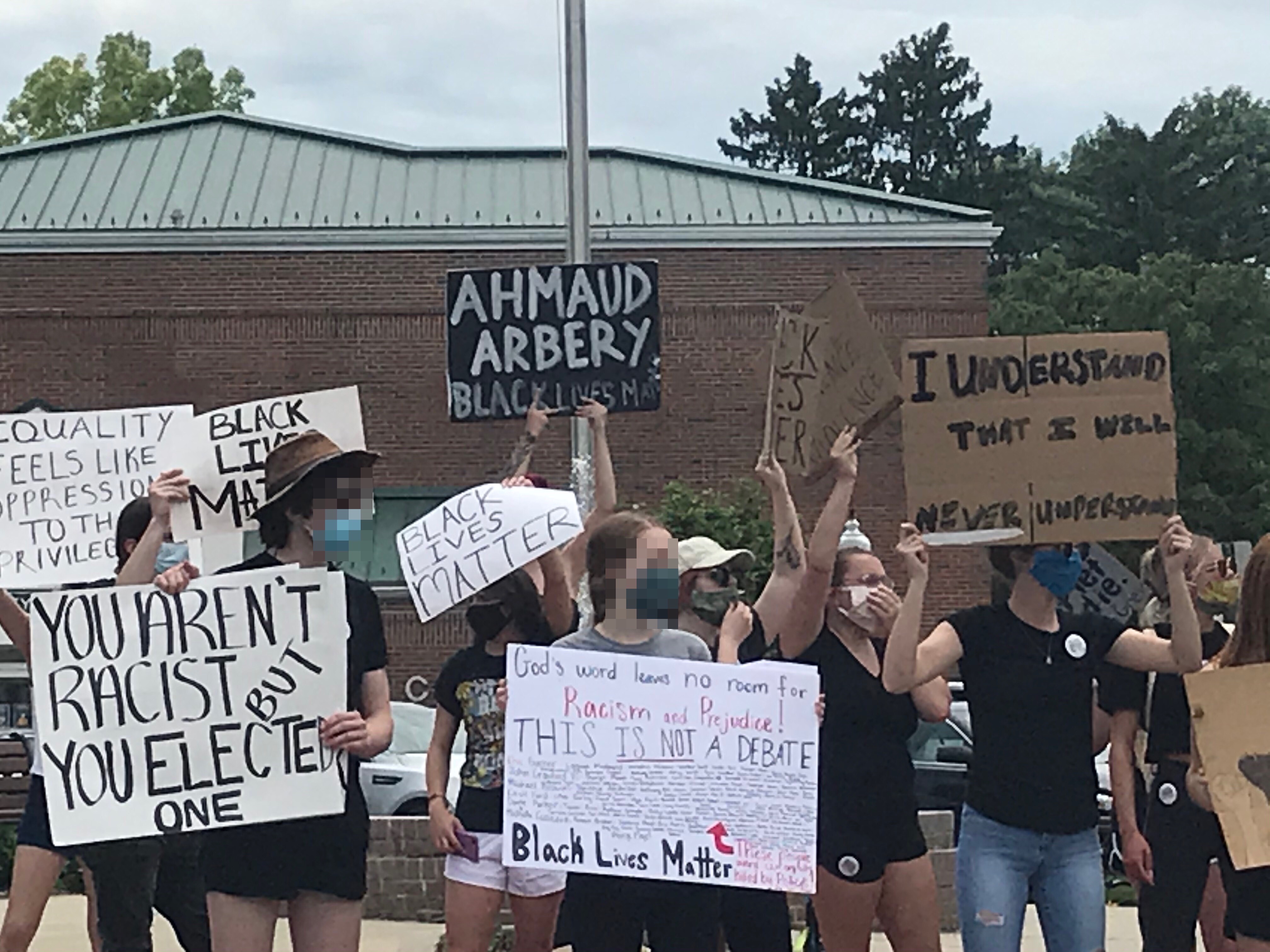By Haley Rey, contributing writer
Photos by Haley Rey
Susan Sontag once said: “A writer, I think, is someone who pays attention to the world.” Lately, I’ve been trying to pay more attention than usual, so as to learn about the movement taking place and to try to be a part of it. After what I’ve learned so far, it seems the best thing I can currently do is inform whomever possible about what is happening and why, and amplify the voices I learn from within the POC community. That is what I wish to do in writing this article.
Last Thursday, a peaceful protest was held in my hometown, Columbia, IL. It included many students and alumni of Columbia’s school district, friends, parents, local business owners, citizens of neighboring towns, etc. The group marched from Bolm Schuhkraft Park to City Hall on Main Street, then remained gathered in front of City Hall for a few hours. Included in the group was a Columbia High School (CHS) alumni named B Phillips (a member of the African American community). B gave a speech as the protestors kneeled before them. The speech, which was incredibly eye-opening for many citizens of Columbia, was as follows:
“On behalf of the African American community I would like to say: the color of our skin isn’t a weapon, and it should not be a death sentence. We shouldn’t have to fear driving, running, wearing a hoodie, listening to loud music, putting our hands in our pockets, or even just sleeping in our own bed! This is America, though- “land of the free, home of the brave,” where corrupt cops brutally murder innocent men, women, and children based on the color of their skin, and the ones that witness it choose to stay silent. What do we do when we need protection from the people who took an oath to protect us? How do we succeed in a country with a system that wants to keep us down? When will we finally feel like we belong in the country we were born and raised in? To the people who think racism isn’t in Columbia, I will tell you that you are wrong. Just because you don’t see it doesn’t mean it doesn’t happen, and I want all of you to go home after this and ask yourself: have I ever been scared for my life when getting pulled over? Has anyone ever clutched their purse while walking past me, or completely crossed the street to avoid walking past me? Have I ever been bullied based on the color of my skin? We are tired of this systemic racism, enough is enough. I and my fellow people of color cannot breathe, so please stop killing us.”

Reader, I’d like for you to re-read this question:
“What do we do when we need protection from the people who took an oath to protect us?”
Why have police officers been attacking more than they protect and serve? When police forces respond to protests about police brutality with police brutality, the system becomes a paradox of racism and abuse of power. As was proven in the Stanford Prison Experiment, those put in a position of power are likely to abuse it. Unfortunately, there have been outstanding numbers of police officers that have proven this point further. Videos of cops shoving senior citizens, kicking individuals that were peacefully kneeling, and running over protestors with their police cars have been going viral online for the last two weeks. Who are the police protecting when they commit these acts? They took an oath to protect and serve their communities, and when they didn’t do their job, the people used their first amendment rights to speak out against it. In response, police forces across the nation proved to be less mature than ever in situations they should have been better trained for. Thankfully, the protesting group in Columbia was not met with brutality from the Columbia Police Department (CPD), but reform in American police departments is still very much in need.
Before the march began for this protest, the group was greeted by the Chief of Police, Jerry Paul. He asked to march with us, but the group decided instead to politely ask him to instead take a different type of action, one less symbolic and more effective considering his position in Columbia. He was given a letter, written by protest organizer Mia Boyer-Edwards, about eight policies the CPD can enforce to decrease police violence. These policies include:
- Require officers to de-escalate situations, when possible, before using force.
- Use a force continuum or matrix that defines/limits the types of force and/or weapons that can be used to respond to specific types of resistance.
- Restrict chokeholds and strangleholds (including carotid restraints) to situations where deadly force is authorized (by the aforementioned force continuum) or prohibit them altogether.
- Require officers to give a verbal warning, when possible, before using deadly force.
- Prohibit officers from shooting at people in moving vehicles, unless the person poses a death threat by means other than the vehicle (for example, shooting at people from the vehicle).
- Require officers to exhaust all other reasonable alternatives before using deadly force.
- Require officers to intervene to stop another officer from using deadly force.
- Require comprehensive reporting that includes both use of force and threats of force (for example, reporting instances where an officer threatens a civilian with a firearm).

Jerry Paul was thanked for his sentiment and given the letter before leaving the group to march through town. Later, the mayor of Columbia, Kevin Hutchinson, joined Paul returning to the protestors to once again speak with Boyer-Edwards about the policies. It was revealed to her and the rest of the group that the CPD has already decided to take action regarding the enforcement of the eight policies. After this information was shared with B Phillips, they decided they’d like to invite Columbia Deputy Police Chief, Jason Donjon (an officer that most students from Columbia know through the D.A.R.E. program) to kneel with them in solidarity, protesting for the murder of George Floyd.
While the support of the CPD was a positive occurrence, police reform is still crucial to improve American communities. We stood that day as part of a demand for police reform (including re-training, defunding, or abolishing police) that all protestors are currently making. We stood asking for the justice of George Floyd, Breonna Taylor, Ahmaud Arbery, Michael Brown, David McAtee, and countless others.
It should also be mentioned that the group witnessed plenty of hate from passersby in Columbia. We were argued with, shown middle fingers behind Trump gear, and B was even directly belittled by a white male about whether or not they had actually feared for their life when in the presence of an aggressive cop before. We still received plenty of support and positivity otherwise, but the fact that we were shown any amount of hate for wanting justice for the racist murders of black men and women is the reason the protests cannot yet cease.

I’ve been told by someone very close to me that “protests will not make a difference.” However, I believe in continuing the fight for a better nation instead of deciding that change is impossible. I believe that America has a lot to make up for, and that protesting for police reform and doing our best to protect those that are still attacked with racism after 400 years is a good start.
Black Lives Matter.
Haley, kudos to you for joining the protest in your own community and using your voice to create change. It is long overdue, for sure.
Haley… your passion for writing, your desire to understand and your willingness to express yourself in a public forum are necessary components to play a productive role in the change needed in today’s society.
Good for you Haley! I love seeing young people step up to the plate and take action.